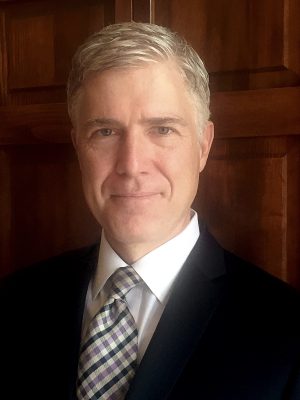Pot's Judicial Wild Card? Trump's Supreme Court Nominee And State-Legal Marijuana
What can we expect from a Justice Neil Gorsuch when it comes to state-legal marijuana?

Judge Neil Gorsuch (U.S. Court of Appeals for the Tenth Circuit)
The future of state-legal marijuana remains in limbo, and Donald Trump’s Supreme Court nominee, Judge Neil Gorsuch, doesn’t help to clear up anything for the twenty-five plus states that now have marijuana legalization or “medicalization.” Judge Gorsuch currently serves on the U.S. Court of Appeals for the Tenth Circuit in Denver, and he’s a resident of marijuana-friendly Boulder, Colorado. A George W. Bush appointee, Judge Gorsuch appears based on his decisions to be an originalist (like Justice Antonin Scalia). Judge Gorsuch takes a generally hard-line stance on criminal law issues, but he’s not so keen on treating federal agencies with reverence, nor is he a fan of executive overreach. And, as Empirical SCOTUS points out, “[o]ther points that have been noted… are Gorsuch’s openness to religious liberty arguments, a pro-business stance, and a loose approach to Eighth Amendment objections to the death penalty.”
Judge Gorsuch’s “tough on crime” approach, combined with his history of pro-business leanings in addition to his constitutional “textualist” approach, could make for an interesting result if Judge Gorsuch, assuming he’s confirmed, ever hears a state-legal marijuana case as a Supreme Court justice. Judge Gorsuch has never even commented on state-by-state marijuana legalization. However, in his time on the Tenth Circuit, he has authored a few opinions relating to marijuana (in mostly a criminal context) that demonstrate where he may stand in the future should state-legal marijuana initiatives, legislation, or state-legal marijuana businesses find themselves in front of SCOTUS.

Is The Future Of Law Distributed? Lessons From The Tech Adoption Curve
In United States v. Quaintance, defendants Daniel and Mary Quaintance were indicted on federal charges of conspiracy and possession with intent to distribute marijuana. The Quaintances claimed protection under the Religious Freedom Restoration Act, which prohibits the federal government from “substantially burdening” sincere religious exercise; they argued that they founded a church where marijuana was a sacrament and deity and therefore their use of marijuana was protected under the Act. The District Court denied the defendants’ motion to dismiss the charges.
Judge Gorsuch upheld the lower court’s ruling because “extensive evidence” showed that “the Quaintances’ professed beliefs are not religious but secular,” and that the facts indicated “that the Quaintances do not sincerely hold the religious beliefs they claim to hold, but instead seek to use the cover of religion to pursue secular drug trafficking activities.” Of course, this is not the first time that a claim of religious freedom in the context of marijuana use has failed, and no one should be surprised by Judge Gorsuch’s conclusion.
In Family of Ryan Wilson v. City of Lafayette and Taser International, Judge Gorsuch’s court ruled on a Colorado police officer’s fatal use of a Taser on a man fleeing from a marijuana arrest. In that opinion, Judge Gorsuch acknowledged that the manufacturing and processing of marijuana may not constitute “inherently violent crimes,” but that the officer was justified to assume that a person illegally growing marijuana may be armed and that the police officer was therefore justified in using the Taser.
Feinberg v. IRS probably gives us the most insight into Judge Gorsuch’s thoughts on state-legal marijuana businesses. In this case, a Colorado dispensary argued that Fifth Amendment protections allowed them to forego reporting financial data to the Internal Revenue Service. The petitioners argued that marijuana production and distribution is a crime under federal law and that by reporting any income derived therefrom to the IRS, they would be inviting federal prosecution in violation of their Fifth Amendment rights. Judge Gorsuch ruled against the petitioners, but his decision did not necessarily support the Department of Justice’s current position on marijuana via the Cole Memo.
Sponsored

The Business Case For AI At Your Law Firm


Legal AI: 3 Steps Law Firms Should Take Now

Navigating Financial Success by Avoiding Common Pitfalls and Maximizing Firm Performance

The Business Case For AI At Your Law Firm

In the Feinberg opinion, Judge Gorsuch acknowledged that the federal government has sent a “mixed message” on state-legal marijuana, with the Department of Justice instructing U.S. prosecutors not to enforce federal law in states with “robust regulation” while, at the same time, the IRS refuses to recognize business-expense deductions for state-legal marijuana businesses because their conduct violates federal law. Somewhat stating the obvious, Judge Gorsuch concluded that “today prosecutors will almost always overlook federal marijuana distribution crimes in Colorado, but the tax man never will.” Judge Gorsuch also noted the federal government’s inconsistent argument as to why a state-legal marijuana business is illegal but yet cannot claim Fifth Amendment protection for tax purposes:
Yes, the Fifth Amendment normally shields individuals from having to admit to criminal activity. But, the IRS argued, because DOJ’s memoranda generally instruct federal prosecutors not to prosecute cases like this one the petitioners should be forced to divulge the requested information anyway. So it is the government simultaneously urged the court to take seriously its claim that the petitioners are violating federal criminal law and to discount the possibility that it would enforce federal criminal law.
In this same opinion, Judge Gorsuch also noted the precarious legal footing under which state-legal marijuana has expanded:
[I]t’s not clear whether informal agency memoranda guiding the exercise of prosecutorial discretion by field prosecutors may lawfully go quite so far in displacing Congress’s policy directives as these memoranda seek to do. There’s always the possibility, too, that the next … Deputy Attorney General could displace these memoranda at anytime.
To date, federal courts have declined to determine the constitutionality of marijuana as a Schedule 1 controlled substance and routinely opine that Congress should be the one to make that change—my guess is that Judge Gorsuch would also likely punt on the issue and leave it to Congress to decide.
Sponsored

Early Adopters Of Legal AI Gaining Competitive Edge In Marketplace

Is The Future Of Law Distributed? Lessons From The Tech Adoption Curve
Ultimately, the rapidly expanding state-by-state marijuana industry could be on a crash course to the Supreme Court over a slew of issues in the coming years. I am cautiously optimistic on how Judge Gorsuch will rule on those cases.
 Hilary Bricken is an attorney at Harris Bricken, PLLC in Seattle, and she chairs the firm’s Canna Law Group. Her practice consists of representing marijuana businesses of all sizes in multiple states on matters relating to licensing, corporate formation and contracts, commercial litigation, and intellectual property. Named one of the 100 most influential people in the cannabis industry in 2014, Hilary is also lead editor of the Canna Law Blog. You can reach her by email at hilary@harrisbricken.com.
Hilary Bricken is an attorney at Harris Bricken, PLLC in Seattle, and she chairs the firm’s Canna Law Group. Her practice consists of representing marijuana businesses of all sizes in multiple states on matters relating to licensing, corporate formation and contracts, commercial litigation, and intellectual property. Named one of the 100 most influential people in the cannabis industry in 2014, Hilary is also lead editor of the Canna Law Blog. You can reach her by email at hilary@harrisbricken.com.







